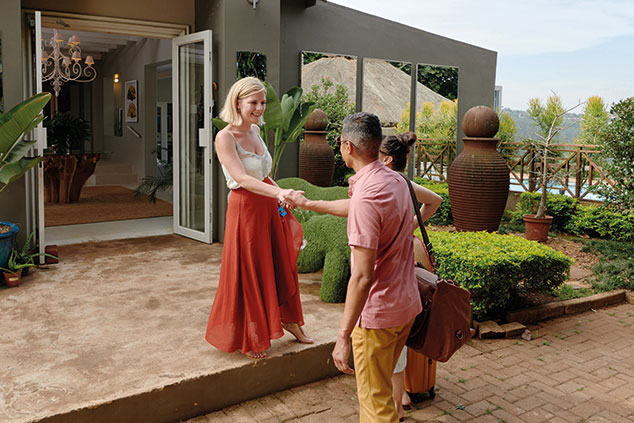
Renting out your property for short-term lets on Airbnb may seem an easy money-spinner. But it’s not as straightforward as it sounds. There are tax, insurance and mortgage implications to consider, and that’s before you even start dealing with guests.
That hasn’t deterred many UK property owners from having a go: Airbnb had 223,200 active listings last year, of which 41% were for a private room in the host’s primary residence and 55% were for an entire house. Properties are typically rented out for 36 nights a year, netting their owners an annual average of £3,100.
Tax breaks
Still, it’s not simply a cheeky earner on the side: the money you make on Airbnb is taxable and you need to declare it to HMRC. That said, there are some tax breaks available. You used to be able to earn £7,500 a year tax free under the government’s rent-a-room scheme, but a rule change this year – dubbed “the Airbnb tax” – means this relief is now only available to those who are also living in the property at the same time. However, if you’re not eligible for that, you can still earn £1,000 a year tax-free under the property income allowance.
Check your mortgage
If you have a mortgage on the property you want to list on Airbnb, you may need to ask permission from your mortgage lender first.
“There’s no obligation for a lender to consent, or it could charge a fee or load your interest rate,” cautions David Hollingworth, director at L&C Mortgages. He says many people just list on Airbnb without speaking to their lender, but this is not a good idea as lying by omission to your lender is mortgage fraud. Banks and building societies are realising that their customers want the option to rent out their properties, and some lenders have written this into their small print.
Nationwide, for example, will accept a certain amount of use as a B&B, as long as no more than two bedrooms are allocated to paying guests, while Metro Bank allows you to let out your property for 90 days a year, notes Hollingworth.
Outsource your hosting
Once the mortgage and tax administration is taken care of, there’s the work of managing bookings, communicating with guests, organising cleaning and changing linen. If you don’t fancy doing this yourself, there are many companies that will do it for you. But they don’t come cheap.
You can usually pay them a percentage of your revenues as a commission, or they can take everything the property earns and pay you a fixed monthly fee, regardless of how your listing performs. Commission charges from companies such as Airsorted, Hostmaker, GuestReady and Your AirHost vary from 5% to 20% for “lite” to “premium” services, with many offering full-service options at a cost of 12%. Charlotte Morris and Kirsty Allsopp are both Airbnb superhosts, meaning they are experienced and highly rated. Kirsty manages her own property, a two-bed annex attached to her family home in Long Clawson, Leicestershire, while Charlotte lives abroad part-time so she uses a management company for her Hackney flat.
While Charlotte found the management company to be quite hands-on at first, the level of support dwindled over time. “I’ve had a ticket in about missing towels for over two months – I’ve given up asking. I’ve had brand new, unopened skincare and food stolen and was very frustrated with the lack of support on this. I’ve lost count of how many times I’ve had to call them to get them to sort stuff out,” she says. “I often wonder if it’s all worth it. When it works, it’s a dream. But for the percentage taken and the extortionate cleaning fees applied, it’s hard not to get really miffed.”
Extra insurance
Kirsty has been doing Airbnb for two years and likes the ability to make money from her extra space, with more flexibility than a long-term let. Admitting she was “naïve” at first, she didn’t consider the need for extra insurance. “We had a guest who opened the wood burner and a log fell and burnt the carpet. It was clearly an accident. If you claim through Airbnb they seek to recoup that money from the guest and that is paid to you. It’s not insurance, which we had assumed it was. Your own home insurance won’t cover areas let out so you need separate insurance.”
The customer is always right
What would these superhosts say to someone who thinks Airbnb is easy money and wants to get involved? “That it’s something you need to carefully consider,” says Morris.
“It’s a strange feeling coming back to your home knowing that a stranger has been there. Things go missing, things break, and no one takes responsibility… On the other hand, it’s a great way to supplement income and, while management companies aren’t perfect, it does take some of the hassle out of it. I wouldn’t have been able to sustain my work and life commitments without it.” Allsopp advises would-be Airbnb hosts to remember that the customer is always right, and as a host you live and die by your reviews. “Airbnb success as a host works on feedback so you always have to go the extra mile to ensure whoever is staying is happy. It’s hard work, but also very rewarding. It’s great to meet different people, but it’s not free money.”